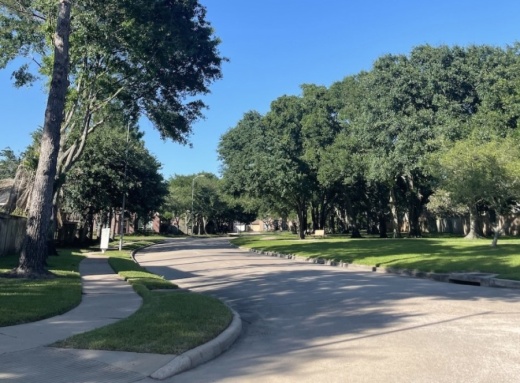“People think the process is intimidating, but it’s not,” said Michael Howard, a property tax consultant with BR Lawson & Co. “If you have the time, you should do it.”
While protesting is becoming increasingly popular, results are mixed; the process frustrates some homeowners; and some neighborhoods appear to be more successful than others. For example, 80% of protests in the Cinco Ranch area are successful, according to data from January Advisors, but areas such as Old Katy have a success rate of about 66%.
Protests offer homeowners one tool to reduce their tax burdens. Meanwhile, some state lawmakers are pushing for additional reforms to the property tax system that was overhauled in 2019 with Senate Bill 2, including calls for new caps on appraisal increases.
Setting values
Each spring, the Harris County Appraisal District—which is an independent entity separate from the county government—begins mailing property owners their market and appraised values for the tax year. The appraised value takes into account any exemptions a property owner might have, such as a homestead exemption.
In turn, these appraised values inform taxing entities such as cities and school districts, which set a tax rate to generate revenue. Property taxes fund a range of services, HCAD Chief Communications Officer Jack Barnett said.
“Property taxes are what support critical local services, primarily education but also police, fire, road maintenance, parks, libraries, all of those things that make a community more desirable,” he said.
Appraisal districts use a process called mass appraisal, which looks at comparable properties within an area to determine a base level of market value, but on a house-by-house level, this approach can result in inconsistencies.
Since the county includes land values along with structures, a property value can also increase year over year as the area becomes more attractive.
“If the properties in your neighborhood go up because it’s a desirable neighborhood, the market value of your house will go up,” Barnett said.
Texas nondisclosure laws prevent sales prices from being released, so the county relies on data provided by third-party firms to get a sense of real estate trends. The county also considers alterations—from new fences to a patio addition—as well as the overall quality of a structure, Barnett said.
Tim Sojka, co-owner and CEO of See Tim Sell Property Group in Katy, is currently protesting the appraisal on both his home and business. He said he has lost twice and won once. Sojka recommends homeowners use companies versed in appraisals to execute a protest.
“You can go fight them but you might lose,” Sojka said. “I’m a Realtor, and I can pull my own costs and go to the tax board myself. But I actually have a life—I don’t have time to go sit in front of a board.”
In the past, Sojka would normally not have recommended protesting an appraisal—but in recent years, he thinks appraisals have become unrealistically high.
“For years, I would tell my clients like, ‘There’s no reason to fight this; it’s close,’" he said. "The last two years has been, ‘They’re being abusive. This isn’t fair.’”
With an appraisal on hand, homeowners face a choice: either accept it or file a protest—either on their own at no cost or by hiring a consultant, like Sojka suggested.
The protest deadline typically falls May 15 with the county accepting both paper forms or online submissions through its iFile system.
The filing is followed by an informal meeting with a district appraiser, who might provide a revised appraisal. The owner then can accept or reject it.
“I would say in the ballpark range of about 30%-40% of our accounts are settled in that process,” Howard said. “But after that meeting ... we’ll go to the Appraisal Review Board.”
The board, which serves as an independent body that resolves disputes between property owners and the appraisal district, holds 1,500 panel hearings each day from May through August, which are currently being held virtually. During the meeting, appellants state their case to three board members.
A property tax consultant, who is paid by taking a portion of the taxes saved, is the preferred choice in Harris County with over 68% of property owners choosing that option when pursuing a protest. However, according to a 2019 January Advisors report, there was not a significant difference in performance between homeowners who hired a firm compared to those who filed a protest on their own.
“A property owner could very well get better results than a consultant because they are so much more familiar with the property,” said Darlene Okonski, a homeowner tax consultant with Marvin F. Poer and Co. “They know the ins and outs of the neighborhood and everything. They’re going to know way more than we would, as far as that goes.”
January Advisors also found the effective discount on property taxes seems to favor residents in wealthy neighborhoods, who are also more likely to protest their values.
Further review
Protest activity has been on an upward trend for at least the past decade with the number of accounts under appeal increasing almost 30%, according to HCAD data.
These appeals are increasingly settled beyond the ARB process with 10 times as many cases going before arbitration in 2019 as in 2010 and almost three times as many cases going into litigation.
State Rep. Cody Vasut, R-Angleton, is one of several state lawmakers who have taken an interest in following up on the Legislature’s 2019 property tax reform efforts by looking to expand these annual caps to business properties and lower the threshold to 3.5%.
“The idea is to make your tax bill more predictable, a smoother increase over time,” Vasut said. “We’re trying to carve off those really high increases.”
House Bill 299 is awaiting a Ways & Means Committee hearing, but a date has not yet been set as of press time.
In 2019, reforms largely targeted taxing entities—such as cities, counties and school districts—imposing a 3.5% cap on annual revenue increases and offering an infusion of state funds to allow for school property taxes to drop.
That was a good step, Vasut said, but it only addressed one side of the equation because an individual’s tax bill is largely shaped by the value assigned by the appraisal district.
In the meantime, taxpayers continue to have the protest process to try to bring their own tax obligations down each year.
“Even if you think your value is OK, protest it,” Howard said. “You should protest. It’s your right to protest your property taxes.”
Laura Aebi contributed to this report.






